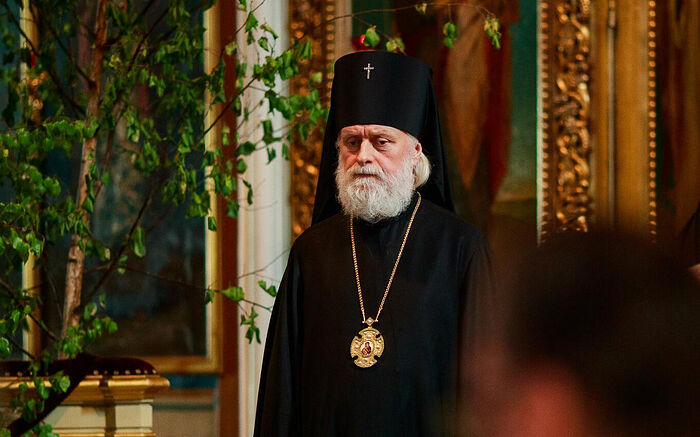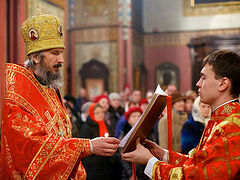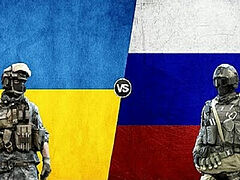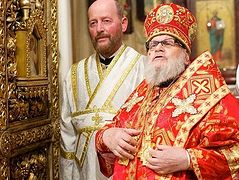Tallinn, October 7, 2022
 Met. Evgeny of Tallinn. Photo: i.err.ee
Met. Evgeny of Tallinn. Photo: i.err.ee
Though the Church in Estonia is being closely monitored by the state for any signs of political influence from Russia, it remains focused on Christ and seeks only to cultivate spiritual peace in the hearts of all, regardless of cultural background or political persuasion, the Estonian Orthodox Church, an autonomous body within the Moscow Patriarchate, affirms in a statement published yesterday.
The state authorities have admitted that they’re unaware of any concerning statements or actions coming from the Estonian Church, and the Church has endorsed a statement condemning the war in Ukraine. Nevertheless, it has had to defend itself several times against accusations and provocations.
On March 17, His Eminence Metropolitan Evgeny of Tallinn and All Estonia was among the signatories of a statement against the war by the Estonian Council of Churches. A week later, His Grace Bishop Lazar of Narva and Prichudie issued a statement condemning all calls for violence and urging all to maintain peace in their hearts and in their relations with others.
Nevertheless, the Church has faced provocations, including “false denunciation to the police about mugs with a portrait of President Putin of the Russian Federation allegedly being sold.”
In August, the Church was forced to publish its, “Objection to Systematic Attacks Against the Estonian Church,” in response to a newspaper article that seriously distorted the history of Orthodoxy in Estonia and the nature of the Church’s present administrative relationship to the Russian Orthodox Church.
And late last month, the Estonian Interior Minister Lauri Läänemets told the media that his department is closely monitoring the Church, looking for any statements or actions in favor of the war in Ukraine. The Minister warned that the state could revoke Met. Evgeny’s residency permit if anything concerning is found.
At the same time, he admitted: “So far, as far as I know, no direct calls or direct action by this Church that justifies war have been identified.”
Nevertheless, Met. Evgeny was summoned to a meeting with Ministry representatives. As he was outside of Estonia at the time, he sent His Grace Bishop Sergei of Maardu in his place, and the bishop again had to defend the Church, explaining that it has never called for war or violence and that it’s very concerned about the provocations against it and the tension in society.
Although the state reiterated at the meeting that it has seen no actual reason to accuse the Estonian Church of working against the state or inciting religious enmity, the nationalist Isamaa (Fatherland) party then issued a call for a complete ban on the Estonian Church, with its property to be transferred to the much smaller Constantinople jurisdiction in Estonia, and its bishops expelled.
Thus, the Church issued another statement yesterday, reiterating that it has already condemned the war and that it always prays for peace, and seeks only to draw all men to Christ.
Read the Church’s full statement below:
The residents of Estonia aren’t indifferent to the ongoing war in Ukraine. Many people have relatives and friends who have found themselves in the conflict zone and, most tragically, on both sides. The echoes of this military confrontation, both through the direct communication of people and through the media, reach our country, drawing the minds and hearts of the residents of Estonia into this confrontation.
The discussion of this topic causes pain, misunderstanding, and embarrassment, as well as enmity and mutual hatred among people, which could eventually lead to a split in our society. All this drains people’s mental strength and distracts them from their daily tasks.
There are accusations against our Estonian Orthodox Church, as if it calls for the continuation of the conflict and for violence, although nothing like this has happened and could not have happened throughout the entire war. Our Church opposes any wars; it is for peace and for the peaceful resolution of any conflicts.
The Estonian Orthodox Church of the Moscow Patriarchate operates in a multinational society that includes people of different levels of education, culture, and different political views. Both locals and refugees come to our churches. The concern of the Church is to offer everyone the only immutable center of gravity—the teachings of Christ, against which everything temporary and transitory must remain in the background. This is the mission of the Church. This shows its peacemaking and unifying role.
The Estonian Orthodox Church of the Moscow Patriarchate supported the statement of the Council of Churches of Estonia dated March 19, 2022, condemning Russia’s military actions in Ukraine. At the same time, calls continue to be made for the Church to give a political assessment of the events taking place, to make constant political statements. But if the Church gets involved in these disputes and, along with political figures, begins to angrily condemn the events taking place, where then will a person find peace for his restless soul?
The Church is called to preach peace in Christ—this is its vocation. This is precisely the preaching in the churches of the EOC-MP. Thanks to this, people with different views on the events taking place have the opportunity to participate in the Divine service and receive spiritual assistance, support, and consolation. In the Gospel, Christ calls for loving both your neighbors and your enemies, and this isn’t some unattainable ideal, since it was realized in the life of Christ Himself and many saints. The first steps on this path are to eradicate hatred from our hearts. We pray now at every Liturgy: “Having given us Thy commandment to love Thee our God and our neighbor, grant that hatred, enmity, resentment, bloodshed and other lawlessness might cease, but let true love reign in the people of the land of Ukraine and in the hearts of us all.” If we manage to achieve such love, then there will be hope that after the war, the intensity of hatred will subside. If the war is stopped only by force of arms, but mutual hatred isn’t overcome, then we can never be sure the conflict won’t break out again.
The Church is also called to carry out a prophetic ministry—to convey the will of God for the people to the consciousness of the people. We’re humbly aware of our spiritual measure and don’t consider ourselves prophets of a universal scale, limiting ourselves in this service primarily to the sphere of our responsibility—the Orthodox faithful of Estonia, parishioners of our churches—leaving the judgment of the rulers and spiritual leaders of the countries to the only infallible Judge—God.
We continue to call parishioners to prayer; to pray for Ukraine, that in times of trouble and tribulation the Lord might accept our prayers and humble tears, that the light of God’s love might enlighten every person suffering in this world. We also call for prayer for our Church so we can continue our ministry of peace unhindered.
We call on all those who make political decisions, who are involved in the media coverage of this conflict, to show restraint and prudence in their words. We see how easy it is to break the peace and how difficult it can be to restore it later. We will seek peace in our hearts, in our families and in our society.
Now the God of peace be with you all. Amen (Rom. 15:33).
Follow OrthoChristian on Twitter, Vkontakte, Telegram, WhatsApp, MeWe, and Gab!



